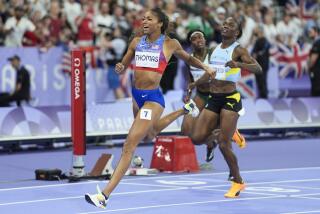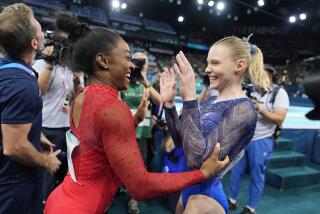Perec Doubles Pleasure as Well
- Share via
ATLANTA — Marie-Jose Perec left France to escape the reporters who hounded her and the photographers who followed her, some of whom seemed more interested in taking pictures of her behind than her face.
She came to Westwood, to UCLA, where she was just another pretty face in a cast of thousands. Like Garbo, she vanted to be left alone.
Well, Thursday night, at Olympic Stadium, she nearly was.
On a night when Michael Johnson shook the track world with his world-record victory in the 200 meters, becoming the first man to complete the 200-400 Olympic double, Perec will be remembered as the night’s hors d’oeuvre.
After Johnson completed his run to glory, blistering the track in 19.32 seconds, he was whisked off to an interview room, where he said of his 200-400 double, “I’m the first person to do this.”
Probably just a slip of the tongue.
Johnson, in fact, was only the second person to “do this” Thursday night.
Fifteen minutes before the men’s 200, Perec chased down Jamaica’s 36-year-old Merlene Ottey with a tremendous burst in the final 10 meters to win the women’s 200 with a time of 22.12. Ottey, who collected her sixth Olympic medal--none of them gold--took the silver at 22.24 while Nigeria’s Mary Onyali took the bronze at 22.38.
Like Johnson, Perec also won the 400 meters earlier this week. If Johnson wants all the facts, he was actually the third “person” to complete the 200-400 double. Valerie Briscoe-Hooks accomplished the 200-400 double at the 1984 Los Angeles Games.
Perec, the long-legged native of the Caribbean island of Guadeloupe, scoffed at the notion that her performance was somehow diminished.
“No, not at all,” Perec said through a translator. “I don’t think I was overshadowed by Michael Johnson. As you can see, there are a lot of people in here. That means they’ve got respect for what I accomplished.”
Ottey, the perennial also-ran who has collected two silver medals and four bronze, had a one-meter lead over Perec coming off the turn, but the runner they call “the Gazelle” ran like one when it counted.
Perec, 28, did not approach Florence Griffith-Joyner’s world- and Olympic-record time of 21.34, set at the 1988 Seoul Games.
Perec and Ottey, in fact, both ran faster times in the semifinals than in the final.
But John Smith, Perec’s coach, said his runner’s moment should not be soon forgotten.
“I think what she did is on the same level,” Smith said of the comparisons to Johnson’s double. “When you win two gold medals, in two different events, that’s a feat itself.”
Perec’s feat will likely carry more weight in the track world because Briscoe-Hooks’ 200-400 double was in a field weakened by the Soviet-led boycott in Los Angeles.
Perec and Smith can, however, thank Johnson for helping to get the Olympic schedule changed last spring so that he might be allowed the chance to chase the 200-400 double.
The move wasn’t made with Perec in mind, but Smith remembers thinking after the switch, “If Michael can do it, she can too. Hmm, this is interesting. But I didn’t say anything for a while. When I mentioned it to her, we looked at each other. She was thinking about that too.”
Perec and Smith wanted to keep her plans secret. Perec was irate when she told a French reporter to hold the story of her plans until a certain date. When it was reported before she thought it should have been, she was so upset that she denied she was going to try the Olympic double.
There was a reason they wanted to keep it quiet.
“The attention was on Michael Johnson,” Smith said. “So let it stay there. Michael was carrying the weight on his shoulders.”
More to Read
Go beyond the scoreboard
Get the latest on L.A.'s teams in the daily Sports Report newsletter.
You may occasionally receive promotional content from the Los Angeles Times.







